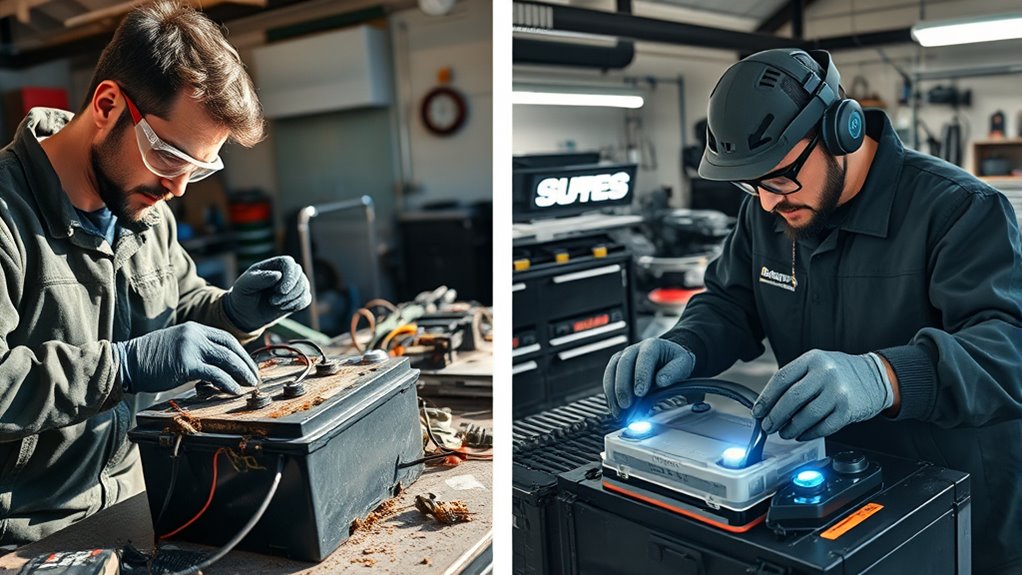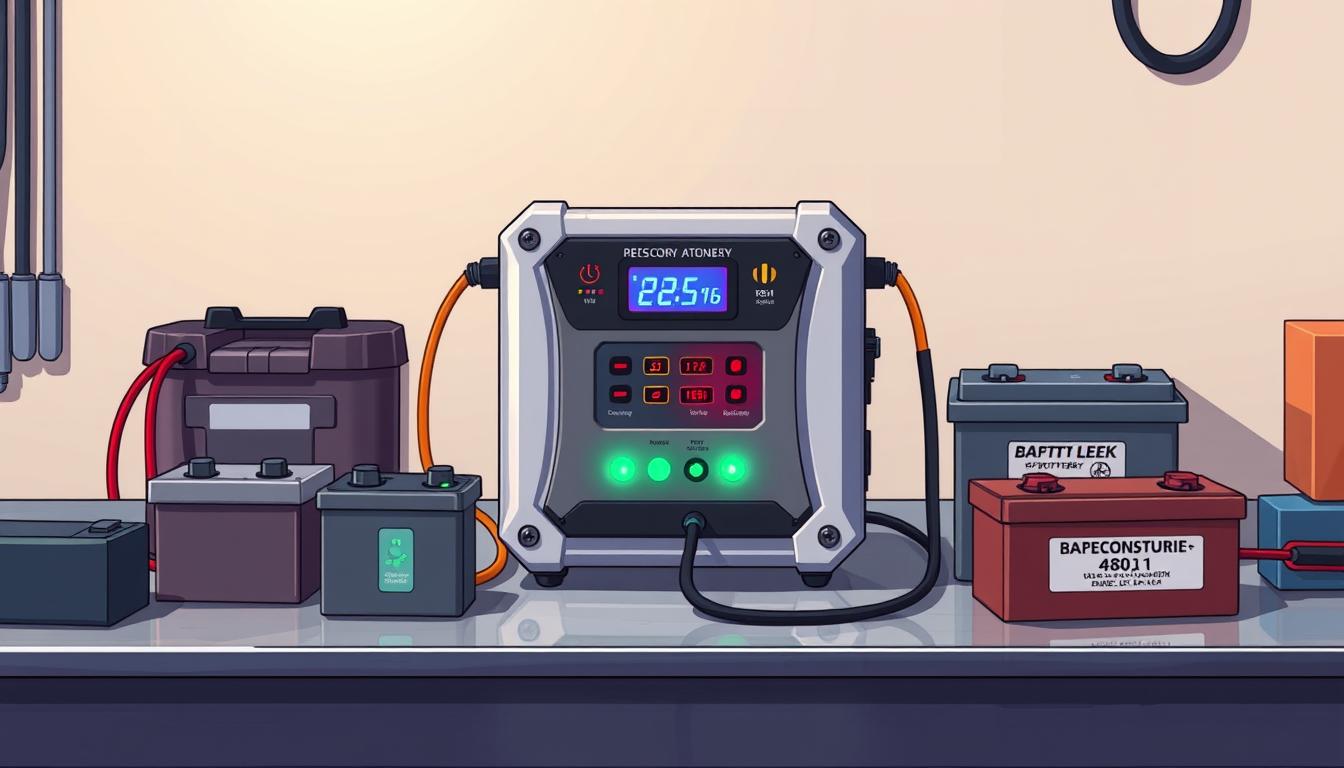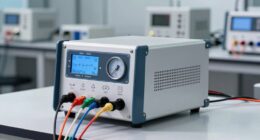If you’re considering reconditioning your car battery, DIY methods can save money and are suitable if you have basic electrical skills, involving cleaning terminals, testing voltage, and slow recharging. However, professional services offer more reliable results, especially for heavily degraded or damaged batteries, with advanced tools and strict safety protocols. Whether you choose to tackle it yourself or seek expert help, understanding both options can help extend your battery’s life—continue to explore for more tips and insights.
Key Takeaways
- DIY reconditioning is cost-effective but requires electrical skills and safety precautions.
- Professional services offer more reliable restoration for heavily degraded or internally damaged batteries.
- DIY methods involve cleaning, testing, and slow recharging, while professionals use specialized diagnostic tools.
- Regular maintenance extends battery life regardless of DIY or professional reconditioning.
- The choice depends on battery condition, skill level, safety considerations, and desired longevity outcomes.

Reconditioning car batteries is a practical way to extend their lifespan and save money, especially if you’re experiencing frequent starting issues or weak performance. When you understand how to properly maintain and restore your battery, you can avoid costly replacements and ensure your vehicle runs smoothly. One key aspect of this process is understanding the factors that influence battery lifespan. Batteries naturally degrade over time, but with proper care, you can slow this process considerably. Regularly monitoring your battery’s health, avoiding deep discharges, and following effective charging techniques are essential steps. The right charging methods prevent overcharging or undercharging, both of which can shorten your battery’s life. Using a quality charger that offers adjustable charging rates and automatic shutoff can optimize the reconditioning process.
Proper maintenance and charging techniques can significantly extend your car battery’s lifespan.
When considering whether to recondition your car battery yourself or seek professional services, think about your skill level and available tools. DIY reconditioning involves a bit of technical knowledge and patience. You’ll need to carefully follow safety protocols, such as wearing gloves and eye protection, because batteries contain corrosive acids and can produce dangerous gases. If you decide to go the DIY route, start by cleaning the battery terminals, checking for corrosion, and testing the battery’s voltage. If the voltage is low, you might attempt to recharge it using appropriate charging techniques, such as slow, steady charging to avoid damaging the internal plates. You may also need to perform a desulfation process, which involves using specialized chargers or additives to remove sulfate buildup that diminishes capacity. Additionally, understanding how color accuracy impacts the overall image quality can help you better appreciate the importance of properly maintaining your battery’s health and performance.
However, reconditioning a battery isn’t foolproof, and sometimes professional services are worth considering. Certified technicians have specialized equipment that can more accurately diagnose the battery’s condition and perform advanced reconditioning procedures. They can restore a battery to near-original capacity more reliably, especially if your battery has suffered extensive sulfation or internal damage. Professionals also ensure safety protocols are strictly followed, reducing risks associated with handling corrosive substances or gases.
Ultimately, your choice depends on your comfort level, the tools you have, and the battery’s condition. If you’re comfortable with basic electrical work and want to save money, DIY reconditioning can be a rewarding project. Just remember that proper charging techniques and regular maintenance are essential for maximizing your battery’s lifespan. On the other hand, if your battery is considerably degraded or you lack the necessary equipment, professional reconditioning might be a safer, more effective option. Either way, understanding how to properly care for your car battery can extend its life and keep your vehicle running reliably.
Frequently Asked Questions
What Are the Safety Precautions for DIY Battery Reconditioning?
When reconditioning car batteries yourself, always wear personal protective equipment like gloves and safety goggles to prevent chemical burns or eye injuries. Handle chemicals carefully, avoiding spills or inhalation of fumes. Work in a well-ventilated area, and keep water nearby to neutralize spills. Disconnect the battery properly and avoid sparks or open flames. Following these safety precautions minimizes risks during DIY battery reconditioning.
How Long Does a Professionally Reconditioned Battery Typically Last?
A professionally reconditioned battery usually lasts between 2 to 5 years, depending on your driving habits and maintenance. You can expect improved battery lifespan and reconditioning longevity when experts handle the process, ensuring thorough cleaning and proper replacement of damaged cells. Regularly checking your battery and following recommended care routines can extend its life further, giving you more reliable performance and better value over time.
Can All Types of Car Batteries Be Reconditioned?
You might think all batteries are indestructible, but not all car batteries can be reconditioned. Battery chemistry and the damage severity determine if reconditioning methods will work. Lead-acid batteries are most commonly reconditioned, while lithium-ion types often aren’t suitable due to their complex chemistry. If your battery is deeply damaged or has a bad cell, reconditioning won’t help. Always check compatibility before attempting to restore your battery.
What Are the Signs a Battery Needs Reconditioning Instead of Replacing?
You’ll want to recondition your battery if you notice it’s losing power faster, taking longer to start your car, or if your battery’s lifespan seems shorter than usual. Poor charging habits can also cause issues, indicating reconditioning might help extend its life. Instead of replacing, try reconditioning first, especially if the battery is still relatively healthy but just needs a boost to restore proper performance.
How Much Does Professional Battery Reconditioning Usually Cost?
Professional battery reconditioning typically costs between $50 and $150, depending on your location and the service provider. The cost comparison shows it’s often more affordable than replacing a battery altogether. Service availability is widespread, with many auto shops and specialty centers offering reconditioning. You should consider this option if you’re looking to save money and extend your battery’s lifespan, especially since professional services guarantee thorough and safe reconditioning.
Conclusion
Whether you choose to recondition your car battery yourself or rely on professional services, remember that both paths demand care, patience, and attention. You can breathe new life into an old battery, saving money and reducing waste, or trust experts to restore power with precision and expertise. Either way, you’re taking control—reviving energy, restoring confidence, and reclaiming the road ahead. Your decision shapes your journey, your effort fuels your success, and your action sparks a brighter, more reliable drive.










